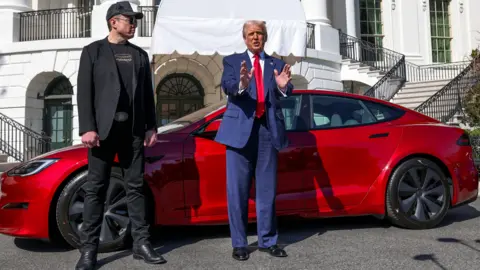Musk to reduce Doge role after Tesla profits plunge
 Reuters
ReutersTesla boss Elon Musk has pledged to "significantly" cut back his role in the US government after the electric car firm reported a huge drop in profit and sales for the start of this year.
Musk has led the newly created advisory body - the Department for Government Efficiency (Doge) - since last year, putting the world's richest man at the heart of cutting US spending and jobs.
But Musk said his "time allocation to Doge" would "drop significantly" from next month, adding he would spend only one to two days per week on it after accusations he has taken his focus off Tesla.
His political involvement has sparked protests and boycotts of Tesla cars around the world.
Temporary government employees, such as Musk, are normally limited to working 130 days a year which, if counted from the day of President Donald Trump's inauguration, is set to expire late next month.
But it is unclear when Musk, who contributed more than a quarter of a billion dollars to Trump's re-election, will step down completely.
Trump said earlier this month he would keep Musk "as long as I could keep him".
The tech boss said he would now "be allocating far more of my time to Tesla", but suggested he would not leave the Trump administration completely, calling the work "critical" and pledging to stay on "as long as the president would like me to do so and as long as it's useful".
On Tuesday, Tesla reported a 20% drop in car sales for the first three months of the year, compared with the same period last year, while profits fell more than 70%.
The company warned investors that the pain could continue, declining to offer a growth forecast while saying "changing political sentiment" could meaningfully hurt demand.
Musk blamed the boycott of Tesla cars on people who would "try to attack me and the Doge team".
Shares in the company had shed about 37% of their value this year as of market close on Tuesday. They rose by more than 5% in after-hours trading following the results.
Trump's tariffs on China also weighed heavily on Tesla. Although the vehicles Tesla sells in its home market are assembled in the US, it depends on many parts made in China. "Rapidly evolving trade policy" could hurt its supply chain and raise costs, according to the company.
"This dynamic, along with changing political sentiment, could have a meaningful impact on demand for our products in the near-term," Tesla's quarterly update said.
Musk has clashed on trade with other Trump administration figures, including trade adviser Peter Navarro.
On Tuesday, Musk said he thought Tesla was the car company least affected by tariffs because of its localised supply chains in North America, Europe and China, but he added that tariffs were "still tough on a company where margins are low".
"I'll continue to advocate for lower tariffs rather than higher tariffs but that's all I can do," he said.
'Problems mounting'
Earlier this month, he called Navarro a "moron" over comments he had made about Tesla. Navarro had said Musk was "not a car manufacturer" but a "car assembler, in many cases".
Georg Ell, who knew Musk and was director for Western Europe at Tesla, told the BBC's Today programme that if the multi-billionaire "focuses on the companies where he is extraordinary, I think people will focus once again on the quality of the product and experiences".
"I think Elon is not someone who surrounds himself with a great diversity of opinion to challenge his thinking, he's a pretty single-minded individual," added Mr Ell, who is now chief executive of translation software firm Phrase.
Tesla said artificial intelligence would contribute to future growth, though investors have been unconvinced by such arguments in the past.
Dan Coatsworth, investment analyst at AJ Bell, called expectations "rock-bottom" after the company said earlier this month that the number of cars sold in the quarter had fallen 13% to the lowest level in three years.
The firm faces fierce competition, Mr Coatsworth said, warning that potential disruption to global supply chains as a result of Trump's trade war also created risks.
"Tesla's problems are mounting," he said.

Follow the twists and turns of Trump's second term with North America correspondent Anthony Zurcher's weekly US Politics Unspun newsletter. Readers in the UK can sign up here. Those outside the UK can sign up here.
